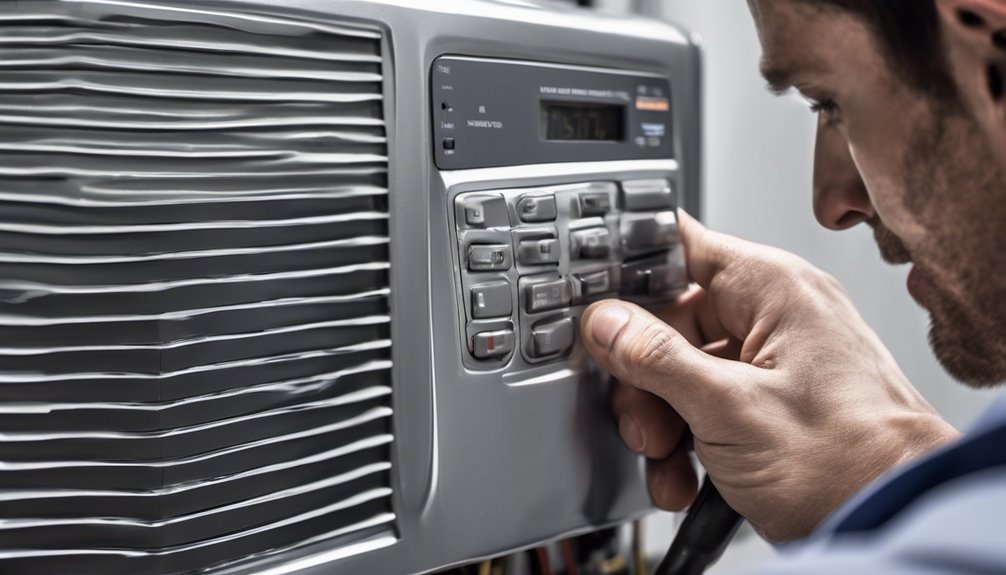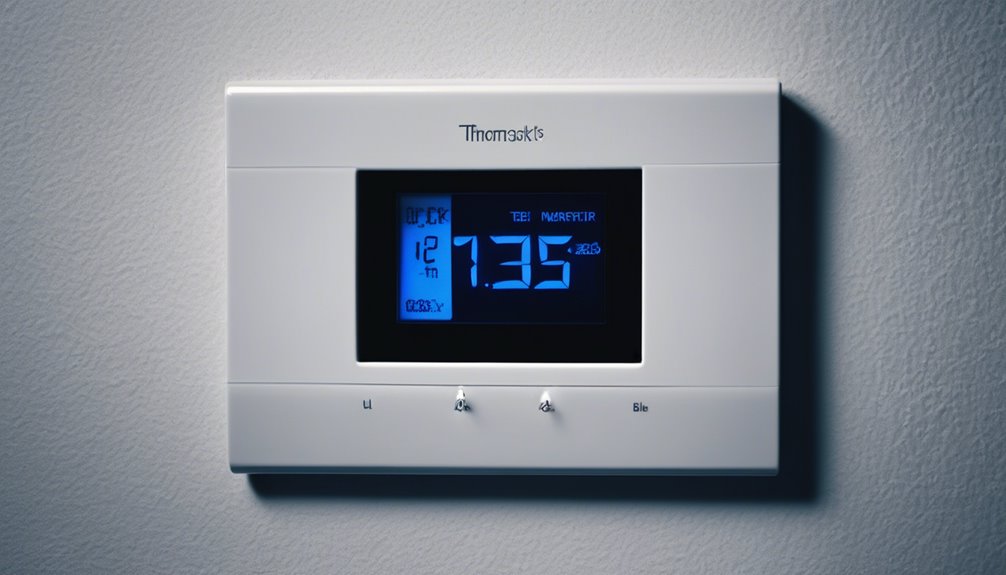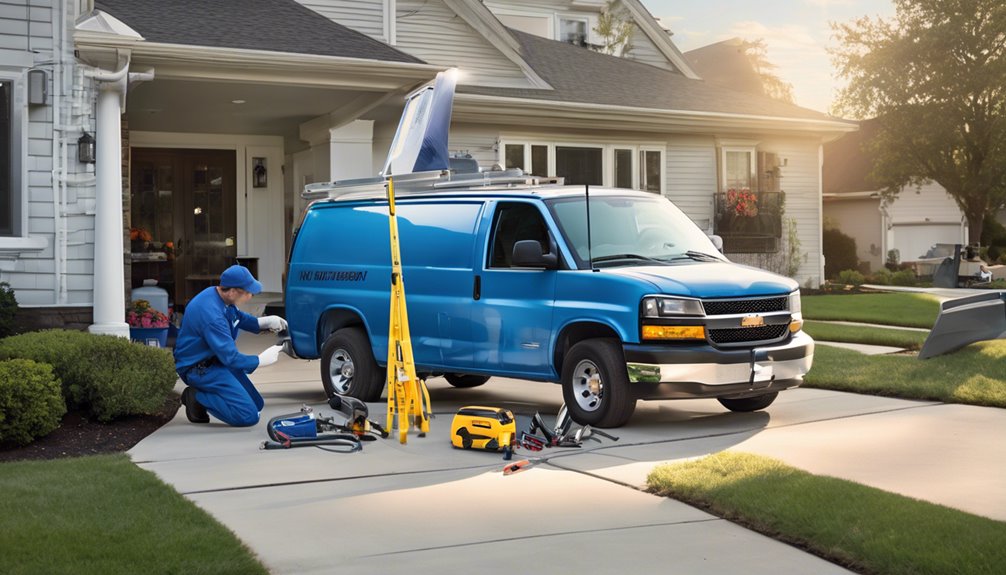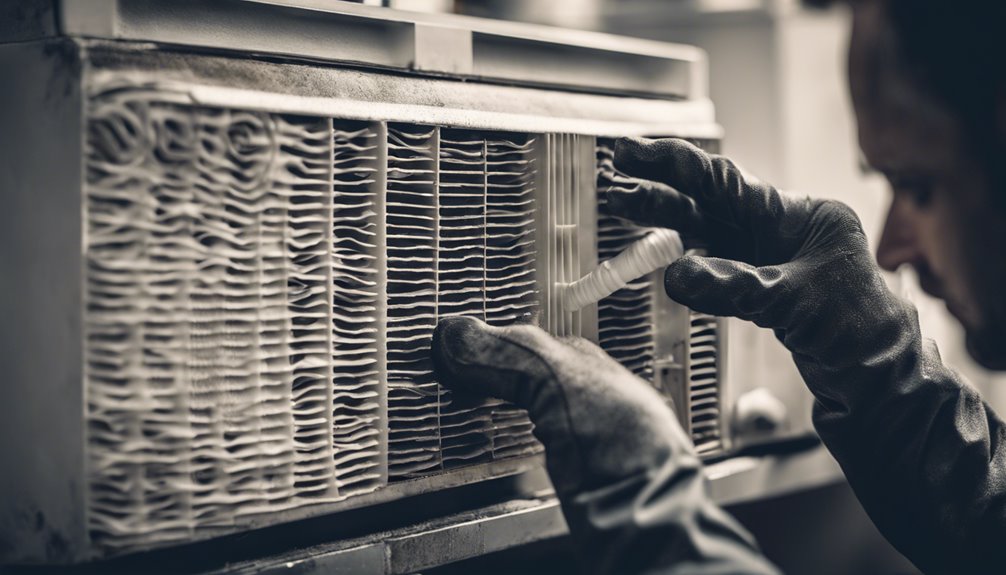When your inverter AC starts acting up, don't panic! Common issues like faulty sensors, compressor malfunctions, and refrigerant leaks can be easily identified and fixed. Regular maintenance can help you avoid these problems altogether. By checking and cleaning air filters, troubleshooting cooling issues, and addressing electrical and water-related problems, you can keep your AC running smoothly and efficiently. Want to learn more about how to diagnose and fix these issues, and even schedule professional maintenance check-ups to keep your AC in top shape?
Key Takeaways
- Regular maintenance helps prevent unexpected breakdowns and ensures optimal performance of inverter ACs, reducing energy consumption and utility bills.
- Faulty sensors, compressor malfunction, and refrigerant leaks are common issues in inverter ACs that require prompt repair to prevent further damage.
- Checking and cleaning air filters every 2-3 months is crucial to maintain inverter AC performance, reduce energy bills, and improve air quality.
- Scheduling maintenance check-ups before peak seasons and prioritizing critical components like compressors and fan motors can help extend the lifespan of inverter ACs.
- Addressing electrical and water-related issues, such as tripped circuit breakers and condensation signs, is essential to prevent complete system failure and electrical fires.
Common Issues With Inverter ACS
When it comes to inverter ACs, you've likely experienced their benefits, including energy efficiency and consistent performance.
However, like any complex system, they're not immune to issues. One common problem is faulty sensors, which can disrupt the inverter's ability to regulate temperature and humidity. This can lead to reduced energy efficiency, a major inverter advantage.
Another issue is compressor malfunction, causing the AC to work harder and consume more power.
Regular maintenance can help prevent these problems, ensuring your inverter AC continues to provide reliable cooling while keeping your energy bills in check. By addressing these common issues, you can maximize the benefits of your inverter AC and enjoy a comfortable, energy-efficient indoor climate.
Identifying Leaks and Water Damage
Your inverter AC's advanced technology can sometimes make it difficult to detect leaks and water damage, but it's crucial to identify these issues promptly to prevent further damage.
Advanced inverter AC technology can mask signs of leaks and water damage, making prompt identification crucial to prevent further harm.
You should regularly inspect your AC unit for signs of leaks or water damage.
- Water stains on walls, ceilings, or floors near the AC unit, which can indicate a leak.
- Check for condensation signs like water droplets or ice buildup on the AC's exterior or interior.
- Look for rust or corrosion on the AC's components, which can be a sign of water exposure.
- Check the AC's drain pan for blockages or clogs that can cause water to accumulate and lead to damage.
Cleaning and Maintaining Air Filters
Dirty air filters can significantly reduce your inverter AC's performance, leading to increased energy bills and potential breakdowns. You need to clean or replace them regularly to ensure your AC runs efficiently.
| Filter Type | Maintenance Frequency |
|---|---|
| Washable Filter | Clean every 2-3 months |
| Disposable Filter | Replace every 1-2 months |
| HEPA Filter | Replace every 6-12 months |
Remember to check your filter every month and clean or replace it as needed. Filter cleaning can be done with a soft brush or vacuum cleaner, but make sure to follow the manufacturer's instructions. If you're unsure about filter replacement, consult your user manual or contact a professional. Regular filter maintenance will help your inverter AC run smoothly and reduce energy consumption.
Troubleshooting Cooling Issues
Proper air filter maintenance is just the first step in ensuring your inverter AC runs efficiently.
Now, it's time to tackle another crucial aspect: troubleshooting cooling issues. If you're experiencing problems with your AC's cooling capacity, don't panic.
There are a few potential culprits to investigate.
Check the following:
- Refrigerant leaks: A leak can cause temperature fluctuations and reduce your AC's cooling capacity.
- Clogged condenser coils: Dirty coils can hinder heat transfer, leading to poor cooling performance.
- Faulty thermostat: A malfunctioning thermostat can prevent your AC from maintaining a consistent temperature.
- Ice buildup: Frozen coils can block airflow and reduce your AC's ability to cool your space effectively.
Dealing With Noise and Vibration Problems
An inverter AC that's making strange noises or vibrating excessively can be a real nuisance.
You're probably wondering what's causing the racket and how to fix it. First, try to identify the source of the noise or vibration. Is it coming from the outdoor unit, indoor unit, or both?
If the issue persists, consider hiring a professional to perform a vibration analysis to pinpoint the problem. Noise reduction techniques, such as balancing the fan or replacing worn-out parts, may be necessary.
Don't ignore these issues, as they can lead to further damage or even complete system failure. By addressing noise and vibration problems promptly, you can enjoy a quieter, more comfortable indoor environment.
Electrical Issues and Faulty Wiring
When you're troubleshooting your inverter AC, you'll often find that electrical issues and faulty wiring are at the root of the problem.
You might notice that your circuit breakers keep tripping, or that your wires are burnt or melted – these are clear signs that something's gone wrong.
Tripped Circuit Breakers
Circuit breakers tripping frequently can be a frustrating and puzzling issue, especially if you're unaware of the underlying causes.
When your inverter AC's circuit breaker trips, it's a sign that something's wrong with the electrical circuit. You need to identify the root cause to prevent it from happening again.
Here are some common reasons why your circuit breaker might be tripping:
- Circuit overload: When you've got too many appliances connected to a single circuit, it can cause the breaker to trip.
- Your inverter AC might be drawing more power than usual, leading to a circuit overload.
- An electrical surge can also cause the breaker to trip, protecting your AC from damage.
- Faulty or worn-out wires can lead to a tripped circuit breaker, so it's essential to inspect the wiring regularly.
Burnt or Melted Wires
Faulty wiring can be a ticking time bomb for your inverter AC, and burnt or melted wires are a clear indication that something's gone wrong.
Overheating causes wire damage, which can lead to a complete system failure. When you notice burnt or melted wires, it's essential to act fast to prevent further damage.
You should turn off the power supply to your inverter AC immediately and avoid using it until the issue is resolved. Check for signs of overheating, such as a burning smell or visible signs of melting.
If you're not sure what to do, it's always best to consult a professional to diagnose and repair the issue. Remember, ignoring burnt or melted wires can lead to more severe problems, including electrical fires.
Refrigerant Leaks and Recharging
When you're troubleshooting your inverter AC, it's crucial to identify refrigerant leaks early on, as they can cause significant damage and efficiency losses.
You'll want to understand the common causes of leaks, such as worn or damaged seals, corrosion, or improper installation.
Identifying Leaks Early
You can't afford to ignore refrigerant leaks in your inverter AC, as they can lead to reduced cooling performance, increased energy bills, and even system failure.
Identifying leaks early is crucial to prevent these issues.
You can take the following steps to detect leaks and prevent them from occurring:
- Regularly inspect the AC's refrigerant lines and connections for signs of wear or damage.
- Monitor the AC's performance and energy consumption to catch any unusual changes.
- Use leak detection methods, such as ultrasonic leak detectors or refrigerant leak detectors, to identify leaks quickly.
- Perform preventative steps, like tightening connections and replacing worn-out parts, to prevent leaks from occurring in the first place.
Causes of Leaks
Refrigerant leaks in your inverter AC can be attributed to various causes, including improper installation, wear and tear, and corrosion.
When your AC is installed incorrectly, the seals and connections can be compromised, leading to leaks. Over time, the condenser coils can corrode, causing refrigerant to escape.
Additionally, a clogged drainage system can put pressure on the entire system, leading to leaks. You may also notice leaks around the AC's valves, fittings, and other connections.
It's essential to identify and address these issues promptly to prevent further damage and ensure your AC operates efficiently.
Recharging Process
The recharging process for your inverter AC involves a series of steps that require precision and attention to detail.
You'll need to identify the source of the refrigerant leak, repair or replace the faulty component, and then recharge the system with the correct amount of refrigerant.
To ensure a successful recharging process, follow these steps:
- Refrigerant handling: Ensure you're handling the refrigerant safely and following proper procedures to avoid further leaks or contamination.
- Inspect the system for any remaining leaks or issues.
- Inverter tuning: Adjust the inverter's settings to optimize its performance with the recharged refrigerant.
- Test the system to ensure it's functioning correctly and efficiently.
Thermostat Malfunctions and Calibration
How efficiently does your inverter AC respond to temperature changes?
A faulty thermostat can lead to thermostat malfunctions, causing temperature fluctuations and reducing your AC's overall performance. You might notice your AC constantly turning on and off or failing to maintain a consistent temperature.
This is often due to thermostat accuracy issues. To resolve this, you'll need to calibrate your thermostat to ensure it's providing accurate temperature readings.
Check your thermostat's battery, clean its sensors, and ensure it's properly installed. If the issue persists, consider replacing the thermostat or consulting a professional.
Proper calibration will help your inverter AC respond efficiently to temperature changes, ensuring a comfortable indoor climate.
Scheduling Professional Maintenance Check-Ups
Scheduling regular professional maintenance check-ups for your inverter AC is crucial to preventing unexpected breakdowns and ensuring optimal performance.
By doing so, you'll avoid costly repairs and ensure your AC unit operates efficiently throughout the year.
To get the most out of your maintenance schedule, consider the following:
- Seasonal scheduling: Schedule maintenance check-ups before peak summer and winter seasons to ensure your AC is ready for the increased usage.
- Prioritize maintenance based on your AC's age and usage.
- Consider priority planning for critical components like the compressor and fan motor.
- Keep a record of all maintenance activities to track your AC's performance and identify potential issues early on.
Frequently Asked Questions
Can I Repair My Inverter AC on My Own?
You can try DIY troubleshooting, but without AC expertise, it's unlikely you'll fix the issue. Inverter ACs are complex systems, and misdiagnosis or incorrect repairs can lead to further damage or even safety hazards.
How Often Should I Top up My Inverter Ac's Refrigerant?
You shouldn't top up your AC's refrigerant frequently, as it often indicates refrigerant leaks, reducing cooling capacity. Instead, inspect and fix leaks, then recharge the system to maintain optimal performance and prevent further damage.
Do Inverter ACS Consume More Power Than Regular ACS?
You're wondering if inverter ACs guzzle more power than regular ones? Generally, they don't; in fact, they're designed for energy efficiency. Inverter ACs adjust compressor speed to match cooling needs, reducing power consumption and saving you energy costs in the long run.
Can I Install an Inverter AC in a Room With No Windows?
You're wondering if you can install an AC in a room with no windows, but you should be concerned about ventilation concerns. You need to ensure good air circulation importance, as a room without windows can lead to stale air and moisture buildup.
Does an Inverter AC Work Efficiently in Extreme Temperatures?
You'll find that most inverter ACs can handle extreme temperatures, but their efficiency takes a hit. Typically, they maintain their cooling capacity up to 46°C, but temperature tolerance varies by model, so be sure to check the specs before making a purchase.
Conclusion
You've got the know-how to tackle common inverter AC issues, from identifying leaks to troubleshooting cooling problems. Remember, regular maintenance is key to extending your AC's lifespan and reducing energy bills. By staying on top of cleaning, checking electrical components, and scheduling pro check-ups, you'll breathe easy knowing your AC is running smoothly and efficiently. Now, take control of your inverter AC's maintenance and repair – your wallet (and the environment) will thank you!



